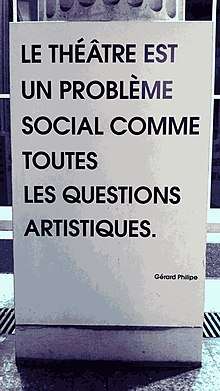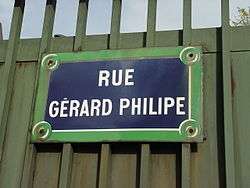Gérard Philipe
Gérard Philipe (4 December 1922 – 25 November 1959) was a prominent French actor who appeared in 34 films between 1944 and 1959. Active in both theater and cinema, he was, until his untimely death, one of the main stars of the post-war period. His image has remained youthful and romantic, which has made him one of the icons of French cinema.
Gérard Philipe | |
|---|---|
Philipe in 1955 | |
| Born | Gérard Albert Philip 4 December 1922 |
| Died | 25 November 1959 (aged 36) Paris, France |
| Occupation | Actor |
| Years active | 1944–1959 |
| Spouse(s) | Nicole Fourcade ( m. 1951) |
| Children | 2 |
Life and career
Early life

Born Gérard Albert Philip[1] in Cannes in a well-off family, he was of one quarter Czech ancestry from his maternal grandmother.[2] His father, Marcel Philip (1893–1973), was a barrister and businessman in Cannes; his mother was Maria Elisa "Minou" Philip, née Vilette (1894–1970). On his mother's advice, in 1944 Gérard changed his surname from "Philip" to "Philipe".
As a teenager Philipe took acting lessons before going to Paris to study at the Conservatoire of Dramatic Art.
Early Films
Philipe made his film debut in Les Petites du quai aux fleurs (1943), directed by Marc Allégret, in an uncredited role.
He had a minor role in Box of Dreams (1945) then was third billed in Land Without Stars (1946) after Jani Holt and Pierre Brasseur; George Lacombe wrote and directed.[3]
When he was 19 years old, he made his stage debut at a theater in Nice; and the following year his strong performance in the Albert Camus play Caligula made his reputation.[4]
Stardom
Philippe had a lead role in The Idiot (1946), an adaptation of the novel by Fyodor Dostoevsky, co-starring Edwige Feuillère for director Georges Lampin. This was widely seen overseas and established Philippe as a leading man. He was in Ouvert pour cause d'inventaire (1946), a short film that was an early work for Alain Renais.[5][6]
He was invited to work with the Théâtre national populaire (T.N.P.) in Paris and Avignon, whose festival, founded in 1947 by Jean Vilar, is France's oldest and most famous.
Philippe gained fame as a result of his performance in Claude Autant-Lara's Devil in the Flesh (1947), alongside Micheline Presle.[7] It was a huge box office success.[8]
He went on to star in La Chartreuse de Parme (1948) for director Christian-Jacque, which was even more popular than Devil in the Flesh. He followed it with Such a Pretty Little Beach (1949) for Yves Allegret; All Roads Lead to Rome (1949), a reunion with Presle, for Jean Boyer; and Beauty and the Devil (1950) for Rene Clair.[8]
Philippe was one of several stars in Max Ophuls' version of La Ronde (1950). He followed it with another all-star film, Lost Souvenirs (1951) for Christian-Jacques.
In 1951, Philipe married Nicole Fourcade (1917–1990), an actress/writer, with whom he had two children. She adopted the pseudonym, Anne Philipe, and wrote about her husband in two books, the first called Souvenirs (1960) and a second biography titled Le Temps d'un soupir (No Longer Than a Sigh, 1963).
Philippe was in Juliette, or Key of Dreams (1951) with Suzanne Cloutier for Marcel Carne; The Seven Deadly Sins (1952), an all-star anthology film; and Fan Fan the Tulip (1953), a swashbuckling adventure with Gina Lollobrigida for Christian-Jacque which was very popular.[9][10]
He was in Beauties of the Night (1952), again with Lollobrigida, and Martine Carol, directed by Clair; The Proud and the Beautiful (1953) with Michele Morgan; two more all-star anthologies: It Happened in the Park (1953) and Royal Affairs in Versailles (1954).
Philippe tried an English movie, Lovers, Happy Lovers! (1954) (also known as Knave of Hearts), directed by Rene Clement and co-starring Valerie Hobson.
He then did The Red and the Black (1954) with Danielle Darrieux and had a big success with The Grand Maneuver (1955) for Rene Clair, co-starring Morgan.[8]
Phillippe did The Best Part (1956) for Yves Allegret and was one of many stars in If Paris Were Told to Us (1956).
He wrote, directed and starred in Bold Adventure (1956), a comic adventure film.[11]
He starred in Lovers of Paris (1957) for Julien Duvivier and Montparnasse 19 (1958) for Jacques Becker. He was one of many stars in Life Together (1958) and top billed in The Gambler (1958).
In 1958 he went to New York and performed on Broadway in the all-French Lorenzaccio and Le Cid.
Phillipe played Valmont in Roger Vadim's modern day version of Les liaisons dangereuses (1959), appearing alongside Jeanne Moreau.[12]
His last film was Fever Mounts at El Pao (1960) for Luis Buñuel.[13]
Death
He died from liver cancer while working on a film project in Paris, a few days short of his 37th birthday. (His doctors concealed from him the nature of his disease.) In accordance with his last wishes, he is buried, dressed in the costume of Don Rodrigue (The Cid), in the village cemetery in Ramatuelle, Var near the Mediterranean Sea coast.[14]
To commemorate the centenary of the cinema in 1995, the French government issued a series of limited edition coins that included a 100 franc coin bearing the image of Philipe. Among the most popular French actors of modern times, he has been elevated to mythic status in his homeland, not least because of his early death at the peak of his popularity.
In 1986, his portrait appeared on a French commemorative postage stamp. There is a film festival named in his honour as well as a number of theatres and schools (such as the College Gérard Philipe - Cogolin) in various parts of France. In Germany he has been scarcely less respected than in his native country; a cultural centre is named after him in Berlin.

Filmography
Acting
| Year | Title | Role | Director | Notes |
|---|---|---|---|---|
| 1944 | Les Petites du quai aux fleurs | Jérôme Hardy | Marc Allégret | |
| 1945 | La boîte aux rêves | Un homme | Yves Allégret and Jean Choux | Uncredited |
| 1946 | Land Without Stars | Simon Legouge / Frédéric Talacayud | Georges Lacombe | |
| The Idiot | Le prince Muichkine | Georges Lampin | ||
| Ouvert pour cause d'inventaire | Alain Resnais | |||
| 1947 | Devil in the Flesh | François Jaubert | Claude Autant-Lara | |
| 1948 | The Charterhouse of Parma | Fabrice del Dongo | Christian Jaque | |
| 1949 | Such a Pretty Little Beach | Pierre Monet | Yves Allégret | |
| All Roads Lead to Rome | Gabriel Pégase | Jean Boyer | ||
| 1950 | Beauty and the Devil | Young Henri Faust | René Clair | |
| La Ronde | the Count | Max Ophüls | ||
| Lost Souvenirs | Gérard de Narçay | Christian-Jacque | (segment "Une cravate de fourrure") | |
| 1951 | Juliette, or Key of Dreams | Michel Grandier | Marcel Carné | |
| Saint-Louis, ange de la paix | Narrator | Robert Darène | Voice | |
| 1952 | The Seven Deadly Sins | the carnival banker / the painter | Georges Lacombe | (segment "Huitième péché, Le / Eighth Sin, The") |
| Fanfan la Tulipe | Fanfan La Tulipe | Christian-Jaque | ||
| Beauties of the Night | Claude | René Clair | ||
| 1953 | The Proud and the Beautiful | Georges | Yves Allégret | |
| It Happened in the Park | Carlo | Gianni Franciolini | (segment: Gli amanti) | |
| 1954 | Royal Affairs in Versailles | D'Artagnan | Sacha Guitry | |
| Knave of Hearts | Andre Ripois | René Clément | ||
| Le Rouge et le Noir | Julien Sorel | Claude Autant-Lara | ||
| 1955 | The Grand Maneuver | Le lieutenant Armand de la Verne | René Clair | |
| The Best Part | Philippe Perrin - l'ingénieur en chef | Yves Allégret | ||
| 1956 | If Paris Were Told to Us | Le Trouvère | Sacha Guitry | |
| Les Aventures de Till L'Espiègle | Till Eulenspiegel | Gérard Philipe and Joris Ivens | ||
| Sur les rivages de l'ambre | Narrator (French version) / Récitant | Jerzy Kalina | Voice | |
| 1957 | The House of Lovers | Octave Mouret | Julien Duvivier | |
| 1958 | The Lovers of Montparnasse | Amedeo Modigliani | Jacques Becker | |
| La Vie à deux | Désiré | Clément Duhour | ||
| Le Joueur | Alexei Ivanovich | Claude Autant-Lara | ||
| 1959 | Les Liaisons dangereuses | Vicomte de Valmont | Roger Vadim | |
| La Fièvre Monte à El Pao | Ramon Vasquez | Luis Buñuel |
Voice
- Le Petit Prince (1954)
- La Vie de W.-A. Mozart - racontée aux enfants (1954)
- Pierre et le Loup (Peter And The Wolf by Sergei Prokofiev) with the Symphony Orchestra of the USSR (1956)
References
- Perisset, Maurice (1979). Alain Lefeuvre (ed.). Gérard Philipe ou la jeunesse du monde. Nice. p. 22.
- Radio.cz
- THE FRENCH CINEMA SINCE THE LIBERATION Hackett, Hazel. Sight and Sound; London Vol. 15, Iss. 58, (Summer 1946): 48.
- THE FRENCH THEATRE: Old Vic's Success; Existentialist's Herror Play Watt, Alexander. The Scotsman (1921-1950); Edinburgh, Scotland [Edinburgh, Scotland]09 Dec 1946: 4.
- Of Local Origin New York Times 04 Feb 1948: 28.
- FILMLAND BRIEFS Los Angeles Times (1923-1995); Los Angeles, Calif. [Los Angeles, Calif]02 June 1948: 23.
- FRENCH FILM WINS PRIZE AT BRUSSELS New York Times 1 July 1947: 30.
- "Box Office Success of Gerard Philippe films". Box Office Story.
- Young Men Produce War Film Los Angeles Times 6 Dec 1953: E3.
- No. 1 in Europe, Gina Throws Curves at U.S. Jacks, Allen. Los Angeles Times 1 Mar 1953: D4.
- BY WAY OF REPORT: Robert Sylvester's New Novel -- 'Kong' Again By HOWARD THOMPSON. New York Times 6 July 1952: X3.
- "GALLIC CENSORS POUNCE; MLLE. 'B. B.' SUBSIDES" by CYNTHIA GRENIER, PARIS. New York Times 11 Oct 1959: X9.
- GERARD PHILIPPE'S LAST FILM Lennon, Peter. The Irish Times 25 Jan 1960: 8.
- "Gérard Philipe". Find A Grave. October 25, 1999.
Stupková, Laurence (April 12, 2001). "Gérard Philippe : comédien français très aimé des Tchèques". Prague.http://www.radio.cz/fr/rubrique/faits/gerard-philippe-comedien-francais-tres-aime-des-tcheques
Bibliography
- Capua, Michelangelo (2008). Gérard Philipe. Alessandria: Edizioni Falsopiano.
- Sadoul, Georges (1962). Gérard Philipe. Belin: Henschelverlag.
- Le Coz, Martine (March–April 1997). "Gérard Philipe, héros stendhalien". Avant-Scène du Cinéma. Paris.
- Stupková, Laurence (April 12, 2001). "Gérard Philippe : comédien français très aimé des Tchèques". Prague.http://www.radio.cz/fr/rubrique/faits/gerard-philippe-comedien-francais-tres-aime-des-tcheques
External links
| Wikimedia Commons has media related to Gérard Philipe. |
- Gérard Philipe on IMDb
- Gérard Philipe at AllMovie
- Gérard Philipe at the Internet Broadway Database

- Gérard Philipe at filmsdefrance.com
- Gérard Philipe at Film Reference
- Gérard Philipe A fan-maintained website
- Gérard Philipe at Find a Grave